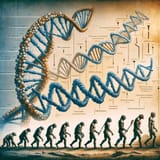>>511338636
>moral truths are grounded in facts about human well-being which are accessible through science
>conscious experience is is central, morality depends on the flourishing of conscious creatures
>science can measure well-being, just as we study health or suffering, we can study moral outcomes
>better and worse lives are objectively different, some ways of living promote well-being more than others, and this difference is factual
>values are facts about minds, moral "oughts" emerge from what objectively leads to human flourishing
basically: what's morally right is what best promotes well-being, and science can help us discover it
however,
moral facts presuppose objective moral values. if harris claims that moral facts are discoverable through science, he's assuming there's a fixed standard of "good" and "evil" already in place. but science only tells us what is, never what ought to be. describing neuronal activity or social flourishing doesn't tell us why one state is morally preferable to another unless we already accept certain values. you can't get an ought from an is without smuggling in a worldview.
if science is our moral compass, who decides which metrics define well-being? pain? pleasure? autonomy? harris never escapes subjectivity. without a transcendent standard like the character of God in Christian theism, his moral framework is vulnerable to cultural bias or utilitarian flattening.
harris borrows moral categories that only make sense in a theistic worldview, concepts like "human dignity" "flourishing" or "value" are intelligible only if humans are made in the image of a moral lawgiver, otherwise these are just poetic illusions written into our neurology.
without God, morality is descriptive at best.
why should anyone act morally? what grounds moral obligation if humans are merely evolved biological machines? on a naturalist view, moral "laws" lack enforcement, authority, and ultimate consequence.
 7/25/2025, 6:11:47 PM
No.511333215
>>511333908
>>511333967
>>511334357
>>511334525
>>511334999
>>511335336
>>511336550
>>511337105
>>511337592
>>511338474
>>511338714
>>511339203
>>511339281
>>511339457
>>511339838
>>511339968
>>511340441
>>511340705
>>511340978
7/25/2025, 6:11:47 PM
No.511333215
>>511333908
>>511333967
>>511334357
>>511334525
>>511334999
>>511335336
>>511336550
>>511337105
>>511337592
>>511338474
>>511338714
>>511339203
>>511339281
>>511339457
>>511339838
>>511339968
>>511340441
>>511340705
>>511340978













